#verbal diversity
Text
it is completely and utterly OK to mess up when speaking. it isn’t a tragedy. it’s awkward and hurts to have voice issues, and not many people understand. but it doesn’t make you wrong or bad.
go fuck up speech,
go get the wrong word order,
take your time,
get the volume wrong,
slur your sentences.
mess up loudly.
talk in the voice you hate.
🌹im sick of being scared and ashamed of messing up. i am bad at speaking. i have very little practice because years of mutism. the last bit is about ppl with voice dysphoria. 🌹
#situational mutism#selective mutism#vocal dysphoria#voice dysphoria#vocal diversity#verbal diversity#positive reminders
35 notes
·
View notes
Text

This was the first time I met Sterling and Tynan and...They can speak?!
Like, I know the guardian/wild horses can speak, but the other magics of Hollow Woods only communicating with a non-verbal way.
And I know Tynan is "philosopher" but tell me, how on earth he got to read those text?!
(I know I am whining a lot about of lack of writing and I mostly try to ignore it but what's up with Hollow Wood's unicorns?)
#sso#alder wolfcake#or there are non-verbal and mute horses#so I guess diversity won again?#I don't know anymore man#and i think sse also don't know anymore#“they magical so they can talk period”#no explanation no nothing#Challenge to sse: Write a dialogue for Tynan referencing philosophers#Tynan saying 'Aideen is dead and we killed her' would be dope ngl
5 notes
·
View notes
Text
Speech loss is not an official term for “people who have temporary, brief episodes of being unable to speak.”
I understand wanting to create distinctions for different types of talking difficulty/inability, but please stop going on peoples posts to say “that’s not semiverbal, that’s speech loss!” as if this definition of speech loss is not currently limited just to some small online circles.
Speech loss has already been used as generic term to talk about loss of speech that might not be temporary or brief—about regression of language skills that may or may not return, caused by various things.
That doesn’t mean a definition can’t ever change, but please don’t talk about it like “temporary episodes of being unable to talk” is a specific, known, pre-established definition that others will understand if you use it like that.
#also problem with people talking like everyone on boundary of semiverbal & verbal MUST have ‘speech loss’ when experiences can be diverse#semiverbal#speech loss#actually autistic#semispeaking#actually disabled#starry thoughts#stop simplifying talking problems into limited simple definitions when it is a lot more complicated than that#lots of different experiences you may not know or understand and have no right to judge stranger#sorry if sound mad. understand people want not to be talked over by people who are different. but answer is not to talk over in return#and try to fix with terms and definitions that not always helpful or have history being used like that
6 notes
·
View notes
Text
this conversation is quite possibly either very dull or total nonsense to anyone who isn't me. will have to revisit it tomorrow and decide.
#the nemesis speaks#jailbirds au#hey i remembered this fic had other characters btw.#(that's a joke i knew they were there the whole time i swear)#nah but we're going back to adaman and irida now. and they are having. an Argument.#but this time it's about politeness and formality wrt wardens and it's very possible this is too niche#to be comprehensible and/or interesting#but the diverse implications that dropping someone's title can have...#are you being informal because you're close? or bc you're disrespecting them?#i care a lot about the Ways Characters Refer to Each Other both verbally and in their heads#jfc i'm going to keep rambling forever aren't i. i wanted to go to bed at a semi reasonable hour tonight too
4 notes
·
View notes
Text
Pintor, nacido en mi tierra
Painter, born in my country
Con el pincel extranjero
With the foreign paintbrush
Pintor, que sigues el rumbo
Painter, following the path
De tantos pintores viejos
Of so many old painters
Aunque la virgen sea blanca
Even if the virgin is white
Píntame angelitos negros
Paint little black angels for me
Que también se van al cielo
Because all of us who are good
Todos los que somos buenos
Can reach heaven too
Pintor, si pintas con amor
Painter, if you paint with love
Por qué desprecias su color
Why do you despise their colour
Si sabes que en el cielo
If you know that in heaven
También los quiere Dios
God loves them too
Pintor de santos de alcoba
Painter of bedroom saints
Si tienes alma en el cuerpo
If there's a soul in your body
Por qué al pintar en tus cuadros
Why have you in painting your paintings
Te olvidaste de los negros
Forgotten black people
Siempre que pintas iglesias
Every time you paint churches
Pintas angelitos bellos
You paint beautiful angels
Pero nunca te acordaste
But you never remembered
De pintar un ángel negro
To paint a black angel
Siempre que pintas iglesias
Every time you paint churches
Pintas angelitos bellos
You paint beautiful angels
Pero nunca te acordaste
But you never remembered
De pintar un ángel negro
To paint a black angel
#THERE'S AN EARTHA KITT VERSION TOO#she was fluent in 4 languages apparently#also i bet this song is like. common knowledge here the most widely known version is by fucking Pedro Infante#but altho my family is mexican they're also very white and racist and hate fun so music was. limited. back then#but like GOD. i've spent the past few days (very unwisely) verbally wrestling with idiots on facebook over 'forced inclusion'#bc of rings of power & the little mermaid & such#but like PEOPLE HAVE KNOWN EXCLUSION & WHITE SUPREMACISTS ARE REAL AND FUCKED UP FOR FOREVER#the poem they adapted the lyrics from is by a venezuelan poet who wrote it before 1940#im just. head in hands. why are they so fucking obtuse#so many of the people arguing that 'black little mermaid = evil' are racialised themselves too :////////////////#like WOW internalised hatred is a hell of a thing#like The Mouse™ isn't radical at all the execs are just signing off on inclusive projects now bc other people did the hard work of-#making that acceptable and profitable first#but like. that doesn't make it HORRIBLE and an OFFENSE to the FANS and DISRESPECTFUL to the ORIGINAL to cast a black actress as a princess#who was white in the previous adaptation#which was itself the furthest thing from faithful to Andersen's original Little Mermaid#which is itself based on Undine from a few years prior#which is also based on previous stuff all the way back to grecorroman water nymphs and THOSE were also surely inspired by earlier shit#like. stories change. that's what they've always done#your childhood isn't ruined by diverse adaptations#you're just an aging racist & terrified of newer generations being better at *checks notes*-#not losing their shit over how other humans are slightly different from them#OR you're young & aping older racists for approval which is sadder#they're the worstttttt#viitalks#ñposting#lindo y jodido#oh also there are Religious Trauma Feelings Here. just. as a note lmao
9 notes
·
View notes
Text
Beyond Just Hand Gestures
Discover the vibrant world of Deaf culture and the rich language of sign language in our latest post, a journey into the heart of a unique and diverse community.
Exploring the Depths of Sign Language
Introduction
The Multidimensional Nature of Sign Language
Hand Gestures: The Foundation
Facial Expressions: The Emotional Context
Body Language: The Supporting Pillar
The Diversity of Sign Languages
The Role of Culture in Sign Language
Technology and Sign Language
Conclusion
Summary
Further Reading
Book Recommendations
Featured…

View On WordPress
#Accessibility#American Sign Language (ASL)#Behavioral Norms#Communication Rights#Community Engagement#Cultural Identity#Cultural Values#Deaf Community#Deaf Culture#Deaf History#Educational Resources#Human Rights#Inclusion#Inclusivity in Society#language preservation#linguistic diversity#Non-Verbal Communication#Sign Language#Social Norms#Visual Language
1 note
·
View note
Text
Florida senior arrested again for violating batterer intervention program terms
(As originally published with additional photos, Tue, January 9th 2024)
THE VILLAGES, Fla. (TND) — A woman in Florida is learning the hard way to follow up on her pre-trial diversion after she was arrested for battery on a loved one.
Authorities said Gretchen Mitchell committed the crime on the day before her 70th birthday, last February 2023.
Her arrest report said she admitted to a deputy…

View On WordPress
#alcohol#altercation#defend#department#diversion#Gretchen#hit#incomplete#Mitchell#physical#record#return#smack#strike#throw#verbal#violation
0 notes
Text
u know I doooo really like it when ppl are verbally affectionate w me. way more than I would probably ever admit tbh 🫣 but I also feel like often when ppl ARE particularly affectionate towards me its a sign they're overcompensating or trying to hide something they're dealing with from me which can be a little frustrating !!
#my mum does this.. and im pretty sure to some extent my flatmate does too altho i dont think i know her quite well enough to tell#and other assorted ppl have in the past. and i rly do get it like sometimes i act brighter and bouncier bc i dont want anyone to know-#im struggling or having a hard time. but it does just make it feel kind of hollow sometimes bc i cant always just take affection at-#face value bc its there as a defense or diversion instead of beinf genuine. or sometimes ppl just act like that bc they want smth from me#im sorry that sometimes i dont reflect it w equal energy bc i am at heart an incredibly affectionate person physically + verbally#there are a wholeass myriad of reasons why i cant dole it out as freely as i want and one of them is this bc i cant always read the-#intent behind it yknow. nothing more heartbreaking. anyway. its 1am but i cant sleep despite being fucking shattered#wauaugghh my brain is trying to drag me into the swamp someone come turn it off pls 😭😭😭😭 ok goodnight#.diaries
0 notes
Note
is tiring and exhausting for me to talk (plus, i hate doing it), i have to force my words outs even when i don't want to, i don't feel comfy around people, however, i'm not autistic (i may be but i can't get a diagnosis)
do you know if theres any term i can use?
it would be selfish for me to use non-verbal communication?
hey anon. this post has lots of terms in it. am pretty sure it’s okay to use these terms even if you’re not sure you’re autistic. if they’re true to your experience with speech, then they are your terms.
things like ‘word-resting’ or ‘on vocal rest’, speech pause, ‘larynx laziness’, ‘talk-tired’.
ones i’ve made up just now are: “i’ve used up all the words”. maybe verbality and vocality are like the social battery, but a ‘verbal battery running low’, ‘verbal/vocal exhaustion’. if you hate speech/speaking, maybe: “speech averse”, “voice averse”.
when you can’t/don’t want to speak, so you have to ‘force words out’, a term i’ve seen is “masked-verbal”. which i think is used to refer to how you’re verbal but only because you’re masking your difficulty with speech. this term specific to autism.
and no. it is not and never will be ‘selfish’ to use non-verbal communication. check out this post.
whether speech/words are impossible, very difficult, or you just don’t like them, you deserve to use what makes you comfortable.
even if you think you don’t ‘technically’ need it, more people should use non-vocal and non-verbal communication, to normalise it.
if things like aac, communication cards, whiteboards, pen and paper etc. help you, then you deserve to use them!
have good day🌹🌹
1 note
·
View note
Text
That one episode from Steven Universe where white diamond talks about people's "imperfections" it's all brilliant because it showcases her ability for gaslighting people on an epic scale. Like not only does she manipulate people in essentially making them not know what to say, but literally invades their minds and makes them do stuff.
"Then I'll do it for you!" Like it's the most epic of all the episodes because at the end they have to convince her that that's not how things really are, even if people have "flaws". That it's okay to be that way, okay to embrace difference. At the end, she realizes the way she's acting is exactly like she told him he was acting, except he's a child. It made her realize she too has flaws and imperfections the same as everyone.
She identified herself as this perfect individual who was never wrong. Once that realization broke her, she was able to be who she really is. Just as Steven was able to be who he is, and the rest of them.
This kind of thing is similar to real life. The issue is that most people's parents won't see this, because their idealisms block them from understanding them. They have wants and desires for their children. They get so caught up in these ideals and parenting as a role, they not only forget who they are and what they believe is right, but don't see who their children really are or who they've become.
That's why that particular episode was so great because it shows what can happen when things go the right way. It's a metaphor for something amazing. Change.
#steven universe#white diamond#cartoons#cartoon moms#metaphors#crystal gems#gaslighting#family abuse#mental abuse#verbal abuse#abusive family#abuse#psychology#parenting#parents#abusive parents#diversity
1 note
·
View note
Note
How do you feel about diversifying police?
here are some clips from an article about the Honolulu Police Department, the police i grew up with&one of the most-- if not THE most-- racially diverse forces in USAmerica, with 21% having claimed to be ethnically Hawaiian&only 12% identifying as white:
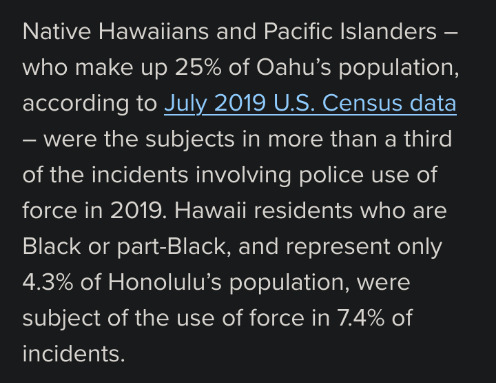


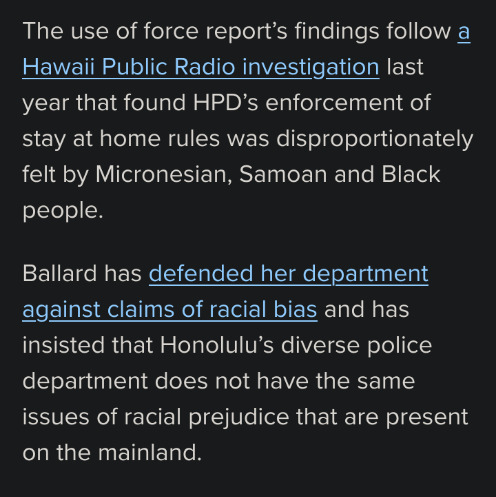
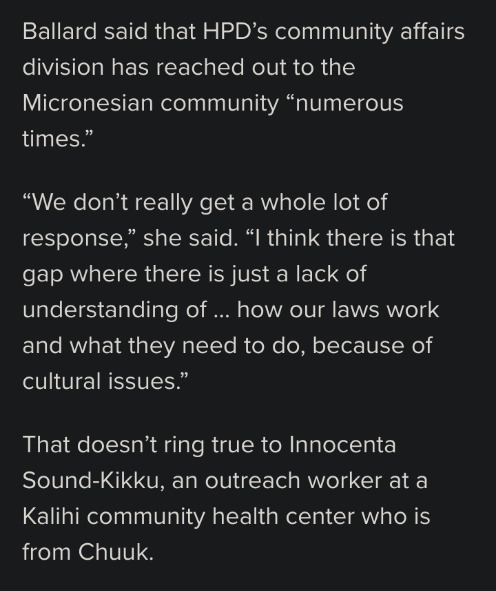
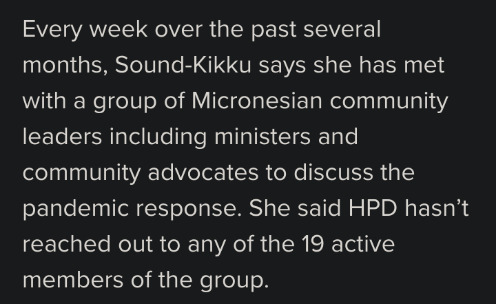
i think this was a stupid question, lmao. when i say all cops are bastards, trust: i mean every fucking one of the inhuman cunts. if i saw a uniformed officer bleeding to death on the street, i'd make sure to stomp ON them, not step over them, regardless of the details of that blood.
#the joke surrounding the hs i graduated from that was exclusively for ethnically hawaiian kids#was that most of us would go on to be either cops or firefighters. it wasnt a totally inaccurate joke.#meanwhile i was sexually&physically&verbally assaulted by the hpd starting at 16 lmao#&watched a cop show up at my house to see my mothers bloody face when i was somewhere around 10#only to tell HER to leave the property bc my dad was the primary lease holder&head of house. oh also he knew him.#my brother had been to court twice by the time he was 17 bc the SAME COP kept following him around to ticket him#so my little brother got called a gang member&asked what drugs he was on after being pulled over for doing 26 in a 25#then got a ticket for being tboned in a roundabout by a Korean woman w no license. she didnt get any ticket#but my brother did bc the car was a rental so he didnt have the insurance paperwork in it when the cop showed up. that HE called.#bc HE was always told that thats what youre supposed to do bc he was raised by our idiot (&v visually local asian) father#not by our very hawaiian mother who told me from the time i was 5y/o that cops arent my fucking friends.#no. i dont give a single fuck about any form of diversity in any police forces unless theyre details on an obit im cheersing to.#(&dont be fooled by the article title btw. regardless of how CoNceRnEd the commission was this article was written in Feb2021#&exactly zero changes have been made to the force since so obviously shit wasnt THAT concerning once the spotlight went away.)#💌
1 note
·
View note
Text


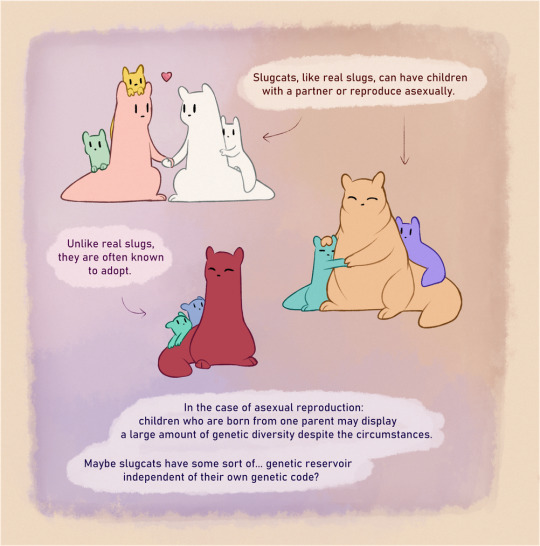
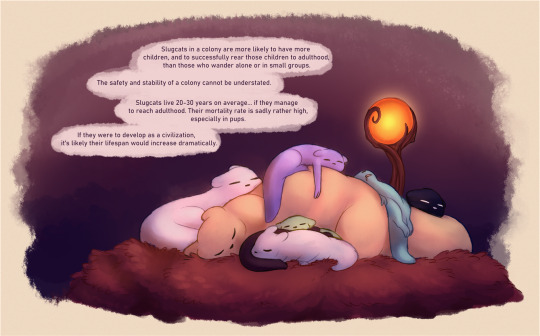
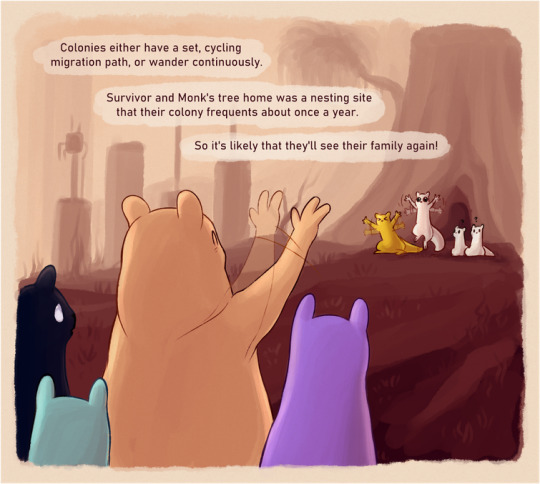


Playing with some ideas mostly regarding gender/reproduction in RW, and slugcat colonies.
Full transcript under the cut!
Creatures in Rain World are typically simultaneous hermaphrodites but require partners to reproduce, with either individual capable of being a genetic donor or carrier. Alongside what we are familiar with, this has lead to interesting reproductive strategies such as rotating donor/carrier roles, or dual/simultaneous genetic swaps.
Rotating donor/carrier roles - A K-selection reproductive strategy. One partner carries the first child, the other partner carries the next child, and so forth. Allows each partner to recover from the demands of childbearing.
Rain Deer aren't quite monogamous, but they tend to choose the same breeding partner whenever mating season rolls around. They serve as a donor one season, then bear and raise a child the next. Calves are raised away from the rain and worm grass, in places that have less food but more safety. Calf wool is softer, not yet gunked up by the dirty rainfall. Their legs are sturdier as children, allowing them to run for cover while the parent wards off threats.
Dual/simultaneous genetic swap - An r-selection reproductive strategy. Parents fulfill the donor and carrier role for each other. The more children you make, the more likely some are to survive!
Multiple batflies lay thousands of eggs in a single "blue fruit." Several eggs congeal and become nutrient paste for the surviving eggs (and for hungry slugcats). Like some plant seeds, batfly eggs that are consumed before pupating can survive passing through the digestive system. Ew.
Ancients also fell under this umbrella. Their genders (and the genders of iterators by extension, who have no sex anyways) could have been determined by a variety of other factors, such as societal role, donor/carrier preference, or simply different categorizations of personal expression.
It's difficult to say how well their common pronouns would translate to ours, but it seems they can translate to an extent, given what Moon and Pebbles use canonically.
Slugcats, like real slugs, can have children with a partner or self-fertilize. Unlike real slugs, they are often known to adopt.
In the case of self-fertilization: children who are born from one parent may display a large amount of genetic diversity despite the circumstances. Maybe slugcats have some sort of... genetic reservoir independent of their own genetic code?
Slugcats live 20-30 years on average... if they manage to reach adulthood. Their mortality rate is sadly rather high, especially in pups. If they were to develop as a civilization, it's likely their lifespan would increase dramatically.
Slugcats in a colony are more likely to have more children, and to successfully rear those children to adulthood, than those who wander alone or in small groups. The safety and stability of a colony cannot be understated.
Colonies either have a set, cycling migration path, or wander continuously. Survivor and Monk's tree home was a nesting site that their colony frequents about once a year. So it's likely that they'll see their family again!
...also, the strength of large colonies are why scavengers are likely to become the dominant species. In the time of Saint's era, continuous migration has become more of a risk, and it has become more difficult to support large populations. Slugcat populations have shrunk back to the more forgiving equatorial zones.
Saint's tongue is pretty unusual and probably unique to them, or to a small population that they hail from. Fur (of varying thickness) is much more common.
Meanwhile, scavengers are bulkier and covered in thicker insulating fur. They:
have seemingly massive populations
have a burgeoning society (the existence of merchants, tolls, bartering, elites and leaders)
are adept at communicating (non-verbally)
manipulate their environment
can build structures (scavenger-made structures were a scrapped idea from Saint's campaign)
can create complex weapons and tools
may have agriculture behind the scenes (unsure if scout parties prioritize exploration or hunting)
I would wager on scavengers developing more quickly than slugcats, but it would be nice if there was a future where both could co-exist.
#oops! impromptu rendering practice!#rotating donor/carrier roles could also be an r-selection strat#but i feel like it'd be more common as a k-selection strat#rain world#worldbuilding#headcanons#flickerdoodles#art#um#ask to tag?#that goes for all of my posts#rw spoilers#dp spoilers#saint spoilers#long post
2K notes
·
View notes
Text
Juno persona chart
mercury in the houses


what is a juno persona chart? looking into juno persona chart gives more detailed insight of how the relationship and marriage overall of you and your spouse will be like. it also describes them in a sense as well. The Greek Goddess Juno is described to rule over love and marriage and hence why the asteroid is looked into for that theme.
mercury is a planet of communication, the mind and the way one talks about things. mercury in the juno persona chart gives insight on how the couple communicates and the mental connection between the two.
reminder: this is my interpretation from observations and first hand experiences, so don't take this to heart.
mercury in 1st house: since this house is ruled by mars lots of quick speech and lots of quick thinking within the marriage. lots of arguing and conflict when it comes to words like using vulgar language quite often and so on. They can quickly grow bored with routine and may need continual mental stimulation and excitement. They like expressing their thoughts, opinions, and ideas with others and may have a natural knack for public speaking or performing arts. They may influence people with their words and thoughts so they can easily get what they want from their partner. ego can be very pungent during communication, so you show your true self when in depth of conversation with your partner and are very ethical and true to what you say.
spouse may have their natal mercury in aries, 1st house, fire sign, fire house (1,5,9)
mercury in 2nd house: each party's thought process is very structured and this is the perfect example of thinking before speaking. whatever comes out of this placements mouth is meaningful and important. speaking pace may be sensual and slow, very clear communication between the two. likely to state the obvious and most predictable and logical things. this placements doesn't like to complicate things so they just get to the point. They may love looking into investment possibilities, analysing market trends, and developing smart financial strategies to increase their wealth and security. This placement may cause money-related anxiety or tension, particularly if they believe they have little control over their financial status so discussions about finance to their partner is common.
spouse may have their natal mercury in taurus, 2nd house, earth sign, earth house (2,6,10)
mercury in 3rd house: communication is very forward and free. no hesitations when it comes to talking to each other. talking is a very important part of the relationship and when something happens the couple just need to talk it out. its all about talking it out. it can be quite damaging actually if there is a block in free communication. Shared interests in studying, reading, and debating diverse topics might be a strong bonding aspect in their relationships. This location indicates versatility and flexibility in communication approaches. Individuals may readily change their method of expressing themselves to fit different situations to their other half. They are more inclined to appreciate their partner if they are as adaptable and open-minded in their communication style.
spouse may have their natal mercury in gemini, 3rd house, air sign, air house (3,7,11)
mercury in 4th house: lots of open and honest communicative styles for this placement. sensitive topics may be a theme for this placement also. both party's communicate with a respectable and loving matter for the other person. including family members or talking about them is common. The individual may come from a household that values open communication and engages in frequent conversation, debate, and idea sharing from what they learnt from their household. They may have learnt to express themselves vocally from an early age and are comfortable conversing with family members. They may find it easier to express their feelings verbally rather than physically, and they may seek intellectual relationships with family members to meet their emotional demands. They may also be prone to overanalysing or intellectualising their emotions in order to gain a better understanding of their partner.
spouse may have their natal mercury in cancer, 4th house, water sign, water house (4,8,12)
mercury in 5th house: very playful and unserious topics can be talked about in the relationship. this placements communication style is quite sensual but very fun and playful, which of course leads to arguments so be careful with that. They may have a way with words that is fascinating and captivating, making them exceptional storytellers. They may also have a sense of humour and wit, and they use words to express themselves and entertain others. These people can exhibit their creativity through writing, public speaking, acting, or any other means of self-expression. They may have a natural flair for presenting their thoughts in innovative and engaging ways, which sets them apart in artistic endeavours. They may love flirting, light-hearted bantering, and verbal expressions of affection. They may also value their intellectual relationship with heir partner and like engaging in fascinating talks.
spouse may have their natal mercury in leo, 5th house, fire sign, fire house (1,5,9)
mercury in 6th house: this placement enjoys mental stimulation and is constantly working their mind. for example in marriage, when going on about the day, this placement cant take their mind of what they did before they left the house, like thinking if they turned off the lights or if they locked the door and so on. lots of precautions and overthinking for this placement. which leads to being critical in everything that they say, like after a conversation between both parties this placement rethinks the whole speaking process and thinks of what they could have said and what they said that was wrong. likely to debate on practical things like where to go for grocery shopping or what gym to go to and so on. lots of conversations about work and routine for example asking 'how was your day', 'how was work?' and so forth. daily check ins and having a routine with their conversations are common. very honest when it comes to health matters, if they are worried about their partners health they take initiative.
spouse may have their natal mercury in virgo, 6th house, earth sign, earth house (2,6,10)
mercury in 7th house: They may express themselves freely and honestly to their partners while expecting the same amount of communication in return. Clear and honest communication is critical to sustaining harmony in their relationships. They may examine the benefits and drawbacks of their relationships, assess their compatibility, and use logic to better comprehend their partner's point of view. These people may be open to new ideas, prepared to negotiate, and find concessions in disagreements. They can readily tailor their communication style to the demands of their partners. They may settle issues by good conversation, identifying common ground, and achieving mutually beneficial agreements. Individuals may need to avoid being overly critical or nit-picky in their relationships with partners.
spouse may have their natal mercury in libra, 7th house, air sign, air house (3,7,11)
mercury in 8th house: very very intense topics. communication is very deep and spiritually inclined. lots of talks about taboo things that others may not feel comfortable with. communication can be full of secrets, discovery of each other throughout communication. this is a very 'i want to know all of who you are' kind of placement. very intense. questions everything about their partner to the tiniest detail. They want to understand the psychological undercurrents of their relationships and are interested in themes that delve into the depths of human experience. Communication in these partnerships is passionate, intimate, and transforming. Their intellectual curiosity motivates them to seek out hidden truths and go into the unknown, both inside themselves and in their relationship. They are more inclined to discuss common money, investments, or shared objectives, in order to build trust and mutual understanding in their marriage. They may be adept at expressing their deepest ideas and feelings, establishing intimacy and trust in their relationships via open and honest communication. They recognise the power of words to heal, empower, and promote progress, and they may actively strive to utilise communication as a tool for personal and relationship development. These people may be drawn to therapy or counselling for personal or professional reasons, and they may have an innate ability to recognise the underlying motivations and dynamics in their interactions.
spouse may have their natal mercury in scorpio, 8th house, water sign, water house (4,8,12)
mercury in 9th house: These folks' relationships rely heavily on deep, meaningful talks and the exchange of ideas. They are prone to admire conversations about broad opinions and an interest in investigating a variety of topics, such as philosophy, religion, or cultural differences. They can show their love and affection through vocal expression, exchanging ideas, and participating in debates or conversations. They value communications that are exhibited well and articulate their thoughts clearly. Travelling together or participating in educational activities as a couple may strengthen their relationship and promote mutual understanding. They may also be in long-distance relationships, having met their spouses while travelling or studying overseas. They like sharing their expertise and experiences with their partner and may feel satisfaction in assisting them to learn and grow. They also value their partner who can teach them new things and widen their horizons. Their connections may include a variety of cultural influences and intellectual hobbies, which enriches their shared experiences.
spouse may have their natal mercury in sagittarius, 9th house, fire sign, fire house (1,5,9)
mercury in 10th house: You and your partner may have a strong cerebral connection and like discussing, debating, and exchanging ideas. both party's perception is intelligent, intellectually fascinating, and capable of participating in meaningful talks. You and your spouse may assist each other's job ambitions by providing practical advice and networking opportunities. Your connection may be tied to your public image or require professional collaboration. You and your partner may approach difficulties logically, using facts and analysis to identify answers. You may also be skilled at talking with authoritative people or navigating professional situations together. Engaging in intellectual pursuits like studying, attending workshops, or discussing ideas helps to improve your partnership. You may also be concerned about how society perceives your relationship and how it affects your own reputations. You may need to be careful not to allow work-related stress or goals dominate the quality time you spend with your partner.
spouse may have their natal mercury in capricorn, 10th house, earth sign, earth house (2,6,10)
mercury in 11th house: communication style is unique for the both of you. maybe it's not something you are used to nor they are either. its a you and them only thing. lots of texting and messages can be sent in marriage, so even when you are not together you still get the time to communicate with them through your phone. lots of speaking with other people like social groups, work, colleagues that you haven't before. Individuals may clearly and precisely describe their future visions, communicating their intentions to others through verbal or writing means. They may also seek comments and advice from their social group in order to refine their goals. Individuals are more inclined to accept fresh ideas, differing viewpoints from their partner. They may be drawn to unorthodox or avant-garde ideas that challenge standard thinking.
spouse may have their natal mercury in aquarius, 11th house, air sign, air house (3,7,11)
mercury in 12th house: Individuals with this placement may have a highly intuitive and attentive communication style, catching up on subtle hints and nonverbal signs. They may have an innate ability to grasp unsaid thoughts and feelings, making them skilled at empathising and providing support in the relationship. this might suggest a preference for secrecy or prudence in communicating. These people may choose to keep certain thoughts and ideas to themselves or express them exclusively in private circumstances. They may be hesitant about disclosing too much about oneself, preferring to retain an air of mystery or seclusion in their dealings. so communication between the couple is very peaceful and intuitive. Individuals with this placement may thrive in areas requiring artistic expression, such as writing, poetry, music, or visual arts. lots of love notes and creating art dedicated to their partner is their love language. These individuals may have a great understanding of the human mind, including their own their partners underlying motives. They may be interested in psychology, psychotherapy, or other disciplines that deal with the complexity of human behaviour and emotions. They may have a natural capacity to connect with their instincts and gut sensations, which may help them navigate the hidden intricacies of relationships. They may also find fulfilment in discussing spiritual or philosophical issues, hoping to get a better grasp of the mysteries of existence.
spouse may have their natal mercury in pisces, 12th house, water sign, water house (4,8,12)


thanks for reading 🫶🏻have a nice day🤍
#juno persona chart#mercury#houses in astrology#astrology#astrology community#astrology observations#sidereal astrology#vedic astrology#zodiac#astro community#astro observations#12th house#astrology readings#kpop astrology#celebrity astrology#persona chart#birth chart#natal chart#astrology chart#fs#future spouse
981 notes
·
View notes
Text


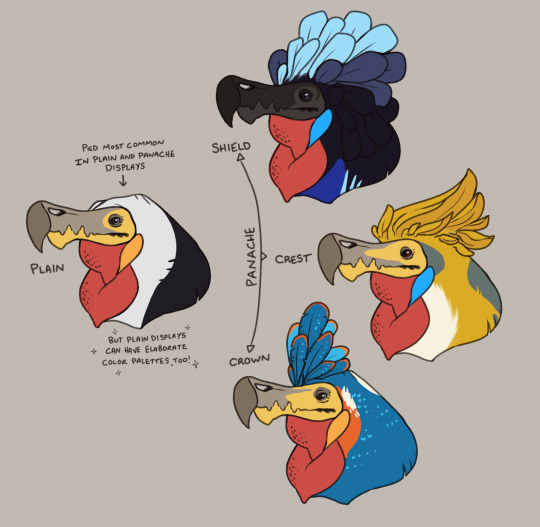
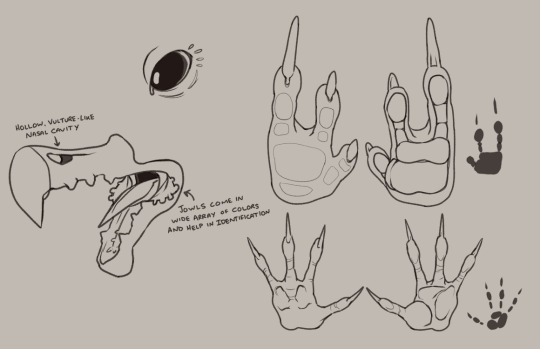
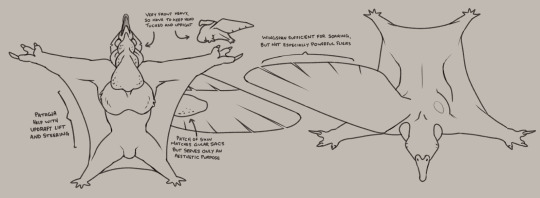
The Mahl
Homeplanet: Roawei and Tik (Twin Planets)
Habitat: High altitude mountain ranges (flying), shrubland (flightless)
Lifespan: 50-90 years
Diet: Hypercarnivorous (≥70% meat consumption)
At first glance, most would not assume that the Mahl, a quadrapedal knuckle-walking avian, are at the forefront of Laurelai Galaxy's interplanetary dipolamtic department. Armed with an elaborate series of gular sacs, Mahl can replicate any noise (verbal or otherwise) to near perfection. This, combined with their high intelligence and unwavering tenacity, gives Mahl quite the advantage when it comes to speaking a wide variety of languages across numerous species. However, mimicry is one thing. Learning the languages is another.
Mahl have four sexes (two fertile, two infertile), five size variations, and two forms of display. More on these under the cut.
The Sexes
Three out of the four sexes serve a biological purpose when it comes to producing and caring for eggs. These are the egg layers, the producers, and the brooders. Egg layers and producers are the fertile pair, with an added brooder, an infertile Mahl with a special brood pouch, to take over incubation duties once the egg is laid.
The fourth sex is the keeper, an infertile Mahl filling a purely social role of gentle caretaking of the other sexes. This would include feeding, grooming, and housekeeping during times of egg laying and brooding, with producers generally absent from the process once insemination has taken place. Not every mate triad has a keeper, though it is highly unusual.
Fertile, egg laying Mahl only produce one egg a time, but mate networks (called 'universities') can be upward of eighteen individuals and can have any combination of the sexes.
The Displays
Mahl have two versions of permanent display: plain and panache. Any Mahl can have either version of display and are not indicators of sex. The three most common forms of panache are shield, crest, and crown, but other variations of panache exist.
Despite not having association with sex, and Mahl tend to prefer merit over looks, many Mahl do appear to be physically attracted to the more flaunting forms of display (even if they won't admit it).
The Sizes
Outside of the obvious differences, Mahl don't hold any outward and widescale prejudice against specific sizes of other Mahl. Even the names are somewhat superficial and are seen more as a fun addition to their identities then anything worth arguing over.
Preferences do exist, and noticeable life-span differentiations have potential to cause social strain. For example: "Little" and "Great" Mahl live the shortest lifespan compared to "Splended" and "Sweet", who live the longest. This doesn't appear to stop diverse mate networks from forming, though finding literal middle ground between the flying and flightless variations is still an ongoing problem
#art#laurelai mahl#speculative biology#alien#if you can get past that weird 'when a bird talks in a human language' robot-ness of their voices they're quite good company
428 notes
·
View notes
Text
How hearing aids work
This is intended as a writing guide, but anyone is welcome to read it to learn more about the different aids used by deaf people.
Please remember that these are based off my experience as somebody who was born deaf in the uk. Other deaf people will have vastly different experiences, and I would encourage you to look up other guides like this
Hearing aids are not always available, particularly if you live in a country without free healthcare. They can be very expensive, both to buy and to take care of
If your character is a deaf child or young teenager, they will need new hearing aid moulds every so often as their ears grow. This only involves going to the hospital for a few hours, and isn't really a big deal. You can get different colours of mould, sometimes sparkly ones, or with tiny embedded designs
Hearing aids cannot get wet, so we take them off to shower, swim, etc. We also take them off to sleep
Hearing aids do not fix hearing loss, and many deaf people still need to lipread and use sign language while wearing them. Please don't try to compare them to glasses!
Some people choose not to wear hearing aids at all, which is a perfectly reasonable and valid decision. Sometimes it is too overwhelming to be exposed to so much noise, sometimes people just prefer to sign or use other non-verbal communication
Not all people with hearing aids know or use sign language
If your character is wearing hearing aids for the first time, they will probably become a lot clumsier while they get used to it
That's all I can think of for now! To any hearing writers reading this, I'm glad you're making an effort to write diverse characters thoughtfully and respectfully!
429 notes
·
View notes
Text
Writing Intellectually Disabled Characters
[large text: writing intellectually disabled characters]
Something that very rarely comes up in disability media representation are intellectually disabled characters. There is very little positive representation in media in general (and basically none in media meant specifically for adults or in YA). I hope this post can maybe help someone interested in writing disabled characters understand the topic better and create something nice. This is just a collection of thoughts of only one person with mild ID (me) and I don't claim to speak for the whole community as its just my view. This post is meant to explain how some parts of ID work and make people aware of what ID is.
This post is absolutely not meant for self diagnosis (I promise you would realize before seeing a Tumblr post about it. it's a major disorder that gets most people thrown into special education).
Before: What is (and isn't) intellectual disability?
ID is a single, life-long neurodevelopment condition that affects IQ and causes problems with reasoning, problem‑solving, remembering and planning things, abstract thinking and learning. There is often delay or absence of development milestones like walking (and other kinds of movement), language and self care skills (eating, going to the bathroom, washing, getting dressed etc). Different people will struggle with different things to different degrees. I am, for example, still fully unable to do certain movements and had a lot of delay in self-care, but I had significantly less language-related delay than most of people with ID I know. Usually the more severe a person's ID is the more delay they will have.
Intellectual disability is one single condition and it doesn't make sense to call it "intellectual disabilities" (plural) or "an intellectual disability". It would be like saying "they have a Down Syndrome" or "he has autisms". The correct way would be "she has intellectual disability" or "ze is intellectually disabled".
Around 1-3% of people in the world have intellectual disability and most have mild ID (as opposed to moderate, severe, or profound). It can exist on its own without any identifiable condition or it can be a part of syndrome.
There is over a thousand (ranging from very common to extremely rare) conditions that can cause ID but some of the most common are;
Down Syndrome,
Fragile X Syndrome,
Fetal Alcohol Syndrome,
Autism,
Edwards Syndrome,
DiGeorge Syndrome,
Microcephaly.
Not every condition always causes ID and you can have one of the above conditions without having ID as long as it's not necessary diagnostic criteria to be met. For example around 30% of autistic people have ID, meaning that the rest 70% doesn't. It just means that it's comorbid often enough to be counted as a major cause but still, autistic ≠ intellectually disabled most of the time.
A lot of things that cause intellectual disability also come with facial differences, epilepsy, mobility-related disabilities, sensory disabilities, and limb differences. A lot, but not all, intellectually disabled people go to special education schools.
Intellectual disability isn't the same as brain damage. Brain damage can occur at any point of a person's life while ID always starts in or before childhood.
"Can My Character Be [Blank]?"
[large text: "Can my character be [blank]?"]
The difficulty with writing characters with intellectual disability is that unlike some other things you can give your character, ID will very directly impacts how your character thinks and behaves - you can't make the whole character and then just slap the ID label on them.
Intellectually disabled people are extremely diverse in terms of personality, ability, verbality, mobility... And you need to consider those things early because deciding that your character is nonverbal and unable to use AAC might be an issue if you're already in the middle of writing a dialogue scene.
For broader context, a person with ID might be fully verbal - though they would still probably struggle with grammar, what some words mean, or with general understanding of spoken/written language to some degree. Or they could also be non-verbal. While some non-verbal ID people use AAC, it's not something that works for everyone and some people rely on completely language-less communication only. There is also the middle ground of people who are able to speak, but only in short sentences, or in a way that's not fully understandable to people who don't know them. Some might speak in second or third person.
Depending on the severity of your character's disability they will need help with different tasks. For example, I'm mildly affected and only need help with "complex" tasks like shopping or taxes or appointments, but someone who is profoundly affected will probably need 24/7 care. It's not infantilization to have your character receive the help that they need. Disabled people who get help with bathing or eating aren't "being treated like children", they just have higher support needs than me or you. In the same vein, your character isn't "mentally two years old" or "essentially a toddler", they are a twenty-, or sixteen-, or fourty five-year old who has intellectual disability. Mental age isn't real. Intellectually disabled people can drink, have sex, smoke, swear, and a bunch of other things. A thirty year old disabled person is an adult, not a child!
An important thing is that a person with ID has generally bad understanding of cause-and-effect and might not make connections between things that people without ID just instinctively understand. For example, someone could see that their coat is in a different place than they left it, but wouldn't be able to deduce that then it means that someone else moved it or it wouldn’t even occur to them as a thing that was caused by something. I think every (or at least most) ID person struggles with this to some extent. The more severe someone's disability is the less they will be able to connect usually (for example someone with profound ID might not be able to understand the connection between the light switch and the light turning off and on).
People with mild intellectual disability have the least severe problems in functioning and some are able to live independently, have a job, have kids, stuff like that.
What Tropes Should You Avoid?
[large text: what tropes should you avoid?]
The comic relief/punching bag;
The predator/stalker;
The "you could change this character into a sick dog and there wouldn't be much difference";
...and a lot more but these are the most prevalent in my experience.
Most ID characters are either grossly villainized (more often if they have also physical disabilities or facial differences) or extremely dehumanized or ridiculed, or all of the above. It's rarely actually *mentioned* for a character to be intellectually disabled, but negative "representation" usually is very clear that this who they're attempting to portray. The portrayal of a whole group of people as primarily either violent predators, pitiful tragedies or nothing more than a joke is damaging and you probably shouldn't do that. It's been done too many times already.
When those tropes aren't used the ID character is still usually at the very most a side character to the main (usually abled) character. They don't have hobbies, favorite foods, movies or music they like, love interests, friends or pets of their own and are very lucky if the author bothered to give them a last name. Of course it's not a requirement to have all of these but when there is *no* characterization in majority of disabled characters, it shows. They also usually die in some tragic way, often sacrificing themselves for the main character or just disappear in some off-the-screen circumstances. Either way, they aren't really characters, they're more like cardboard cutouts of what a character should be - the audience has no way to care for them because the author has put no care into making the character interesting or likable at all. Usually their whole and only personality and character trait is that they have intellectual disability and it's often based on what the author thinks ID is without actually doing any research.
What Terms to Use and Not Use
[large text: What Terms to Use and Not Use]
Words like: "intellectually disabled" or "with/have intellectual disability" are terms used by people with ID and generally OK to use from how much I know. I believe more people use the latter (person first language) for themselves but i know people who use both. I use the first more often but I don't mind the second. Some people have strong preference with one over the other and that needs to be respected.
Terms like:
"cursed with intellectual disability"
"mentally [R-slur]"
"moron"
"idiot"
"feeble-minded"
"imbecile"
is considered at least derogatory by most people and I don't recommend using it in your writing. The last 5 terms directly come from outdated medical terminology specifically regarding ID and aren't just "rude", they're ableist and historically connected to eugenics in the most direct way they could be. To me personally they're highly offensive and I wouldn't want to read something that referred to its character with ID with those terms.
(Note: there are, in real life, people with ID that refer to themselves with the above... but this is still just a writing guide. Unless you belong to the group i just mentioned I would advise against writing that, especially if this post is your entire research so far.)
Things I Want to See More of in Characters with Intellectual Disability
[large text: Things I Want to See More of in Characters with Intellectual Disability]
[format borrowed from WWC]
I want to see more characters with intellectual disability that...
aren’t only white boys.
are LGBT+.
are adults.
are allowed to be angry without being demonized, and sad without being infantilized.
are not described as "mentally X years old".
are respected by others.
aren't "secretly smart" or “emotionally smart”.
are able to live independently with some help.
aren't able to live independently at all and aren't mocked for that.
are in romantic relationships or have crushes (interabled... or not!).
are non-verbal or semi-verbal.
use mobility aids and/or AAC.
have hobbies they enjoy.
have caregivers.
have disabilities related to their ID.
have disabilities completely unrelated to their ID.
have friends and family who like and support them.
go on cool adventures.
are in different genres: fantasy, romComs, action, slice of life... all of them.
have their own storylines.
aren't treated as disposable.
don't die or disappear at the first possible opportunity.
...and I want to see stories that have multiple intellectually disabled characters.
I hope that this list will give someone inspiration to go and make their first OC with intellectual disability ! This is just a basic overview to motivate writers to do their own research rather than a “all-knowing post explaining everything regarding ID”. I definitely don't know everything especially about the parts of ID that I just don't experience (or not as much as others). This is only meant to be an introduction for people who don't really know what ID is or where to even start.
Talk to people with intellectual disability (you can send ask here but there are also a lot of other people on Tumblr who have ID and I know at least some have previously answered asks as well if you want someone else's opinion!), watch/read interviews with people who have ID (to start - link1, link2, both have captions) and try to rethink what you think about intellectual disability. Because it's really not that rare like a lot of people seem to think. Please listen to us when we speak.
Good luck writing and thank you for reading :-) (smile emoji)
mod Sasza
#mod sasza#writing intellectually disabled characters#neurodivergency#terminology#long post#writing advice#writing disabled characters#writeblr#writing reference#writing disability#writing tips#writing resources#writing help#intellectual disability representation
2K notes
·
View notes